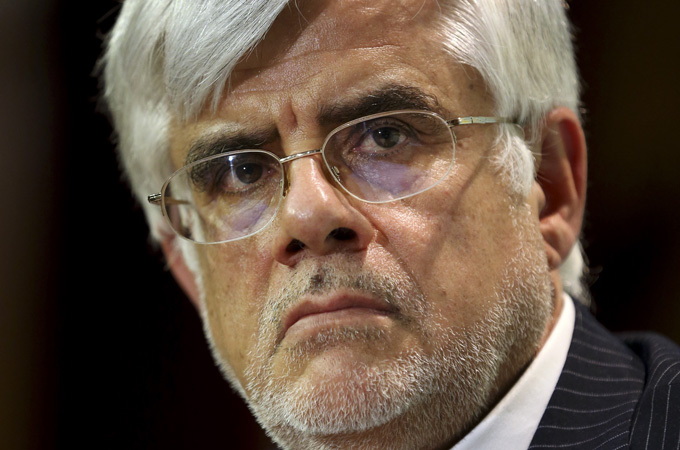Profiles: Iran’s presidential candidates
The June 14 election campaigns will likely focus on the economy, as eight men seek the required majority to win.
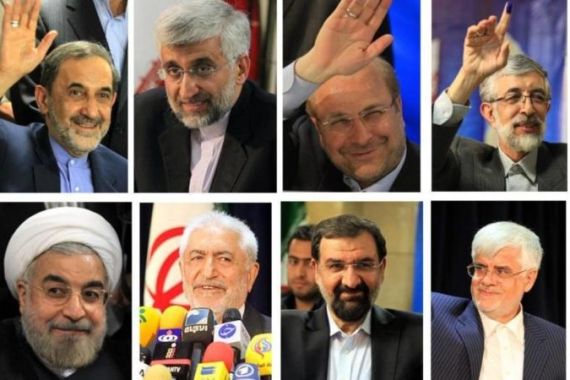
Iran’s all-powerful Guardian Council has chosen a final list of eight presidential candidates out of 686 hopefuls.
With half of that council chosen by the country’s Supreme Leader Ayatollah Ali Khamenei, it is generally expected that those who are chosen are close to Khamenei and his hard-line supporters.
Several reformist candidates were on the ballot in 2009. Then violent protests occurred across the country after Mahmoud Ahmadinejad took his second term. In 2013, allowing any serious anti-establishment candidates on the ballot would seem like a risk.
Here are the presidential contenders for the June 14 election:
| Saeed Jalili |
 |
| Jalili lost part of his leg while fighting in the Iran-Iraq War [AP] |
Born in 1965 in Mashhad, Jalili fought in the Revolutionary Guard during the Iran-Iraq War, where he lost the lower part of his right leg and reportedly survived two gas attacks. After the war, he earned a doctorate in political science from Imam Sadeq University in Tehran, where he wrote a dissertation on the Prophet Muhammad’s foreign policy.
Jalili worked in Iran’s foreign ministry starting in 1989, and ran Supreme Leader Ali Khamenei’s office from 2001 until 2005. He then became an adviser to newly elected President Mahmoud Ahmadinejad, who appointed him as deputy foreign minister for European and American affairs.
In 2007 he was appointed as the Secretary of Iran’s Supreme National Security Council, a position he still holds. He did not have an extensive diplomatic background, and so his elevation to that position – which made him Iran’s chief nuclear negotiator – surprised commentators.
A US State Department cable released by WikiLeaks in 2008 described how a European Union official who met Jalili “was struck by his seeming inability or unwillingness to deviate from the same presentation … calling him ‘a true product of the Iranian revolution’.”
In an interview with the Boston Globe in 2006, Jalili defended Iran’s plans to develop nuclear energy, noting that under the Shah’s rule before the Islamic Revolution, US companies had contracts to build nuclear power plants there. In a May 2013 interview with the Financial Times, Jalili said he planned to “defend the rights of the Iranian nation in various areas that should not be violated by others”.
On the war in Syria, Jalili has said: “From the start, Iran has said that the solution to the Syrian crisis is not military but political. The US adopted the wrong approach and supported terrorists to pursue its goals.” Iran’s views on Syria, Jalili explained, “have been in common with [those of] Russia”.
Jalili is a member of the Front of Islamic Revolution Stability party. He has not held elected office before, and lost two parliamentary races in 2000 and 2004. He has said he supports more privatisation and a crackdown on corruption.
| Mohammad Baqer Qalibaf |
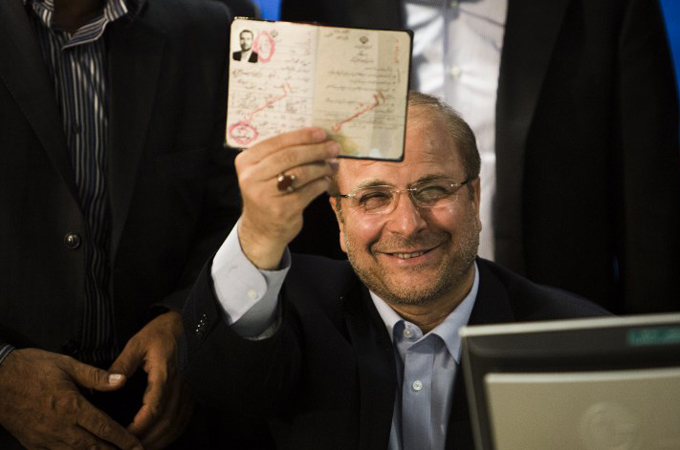 |
| At 19, Qalibaf was one the commanders of Iran’s defence forces [AFP] |
The current mayor of Tehran, Mohammed Baqer Qalibaf has been a staunch critic of Iranian President Mahmoud Ahmadinejad. Yet, like Ahmadinejad, Qalibaf has said he will use his position as mayor of Tehran as a springboard to the presidency.
Qalibaf, the son of a grocer, was born in 1961 and grew up near Mashhad in Iran’s northeast. He served in the Iran-Iraq war and played a large role in recapturing the city of Khorramshahr in 1982 from Iraqi forces. The victory is still celebrated every year in Iran.
He served as the commander of the Iranian Revolutionary Guards air force from 1996 to 1999, and a 2008 US State Department cable published by WikiLeaks said the mayor continues to “pilot Iran Air commercial flights on a regular basis in order to keep his licence current”.
After large student protests in 1999, Qalibaf was appointed the national chief of police by Iranian Supreme Leader Ali Khamenei, and was in charge of Iran’s response to another round of student protests in 2003. As police chief he allowed women to join the force, and set up an emergency hotline similar to “911” in the US.
Ahmadinejad and Qalibaf are rivals, and Qalibaf has accused the government under Ahmadinejad of holding back funds from being distributed to Tehran. In 2011, when Qalibaf wanted to travel to the US to receive an award from the Institute for Transportation and Development Policy, Iran’s foreign ministry did not permit him to leave.
Qalibaf, who holds a doctorate in political geography, has portrayed himself as calmer and more polished than the bombastic Ahmadinejad. The president’s style, Qalibaf believes, has needlessly hurt Iran’s interests. “One can talk to the world in much better ways,” he said in an interview in 2008.
The 2008 US diplomatic cable said Qalibaf “appears to packaging himself as the anti-Ahmadinejad, i.e. a pragmatic moderniser, not an ideologue”.
Qalibaf has tried to cultivate an image as a can-do manager. He has been the mayor of Tehran, Iran’s capital and largest city, since 2005 – when Ahmadinejad first became president. As mayor, he has won plaudits for building up the capital’s infrastructure – improving public transportation and garbage collection, constructing bridges and tunnels and establishing new parks.
Yet Qalibaf, a conservative seen as close to Khamenei, has also made statements designed to appeal to hardliners. In a 2009 speech, Qalibaf boasted of working with Hezbollah commander Imad Mughniyeh, the mastermind of several attacks on the US military, who was assassinated in Syria in 2008. And Qalibaf is reported to have recently told students serving in the Basij militia that he personally beat students with batons during the 1999 protests.
Qalibaf also ran for president in 2005, when he came in fourth place with just under 14 percent of the vote. He was widely tipped to run in 2009 as well, but did not do so.
In the upcoming election, Ghalibaf has formed the 2+1 Coalition with two fellow “principlist” conservatives devoted to Khamenei and opposed to Ahmadinejad: Gholam-Ali Haddadadel and Ali Akbar Velayati.
| Ali Akbar Velayati |
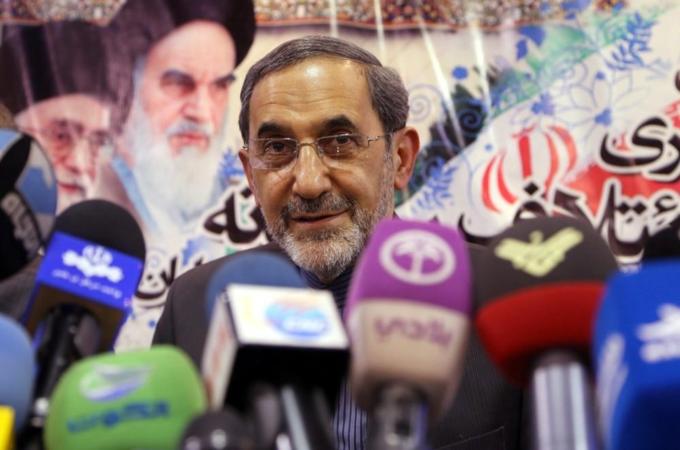 |
| Velayati is currently foreign policy adviser to Iran’s Supreme Leader [EPA] |
Ali Akbar Velayati has been one of Iran’s longest-serving politicians, acting as foreign minister for 16 years – under then-President Ali Khamenei from 1981-89, and under President Rafsanjani from 1989-97.
Born in 1945 in Shemiran, north of Tehran, Velayati studied paediatrics at Tehran University and infectious diseases at Johns Hopkins University in the US. He was active with the Second National Front, a nationalist group, during the early 1960s and says he was tortured by SAVAK – the Shah’s secret police – for his political activities.
After the 1979 revolution that overthrew the Shah, Velayati worked at the Ministry of Health and served in parliament. He was appointed foreign minister in 1981, and presided over the peace agreement that ended the Iran-Iraq War in 1988.
In 1997, a German court alleged that Velayati, among others, approved the killings of several Kurdish leaders at a restaurant in Berlin in 1992.
He was appointed to the Strategic Council on Foreign Relations in 2006. Velayati appears to be close to Supreme Leader Ali Khamenei, serving as his advisor on international affairs today and writing the introduction to Khamenei’s book Palestine.
Velayati, a hardliner who has described Iran as the “backbone” of the Muslim world, has frequently condemned the United States and Israel. He compared former US President George W Bush to Adolf Hitler in 2002, and said efforts by reformist Iranian President Mohammad Khatami to draw closer to the US had proven that Washington had not changed its stance since 1979
Now, however, Velayati has said he wants to improve Iran’s international relations, and has criticised President Ahmadinejad’s foreign policy. Velayati has never run for office before. He had announced he would run in the 2005 presidential elections, but later withdrew.
Along with Mohammed-Baqer Ghalibaf and Gholam-Ali Haddadadel, Velayati is a member of the 2+1 Coalition.
| Gholam-Ali Haddad Adel |
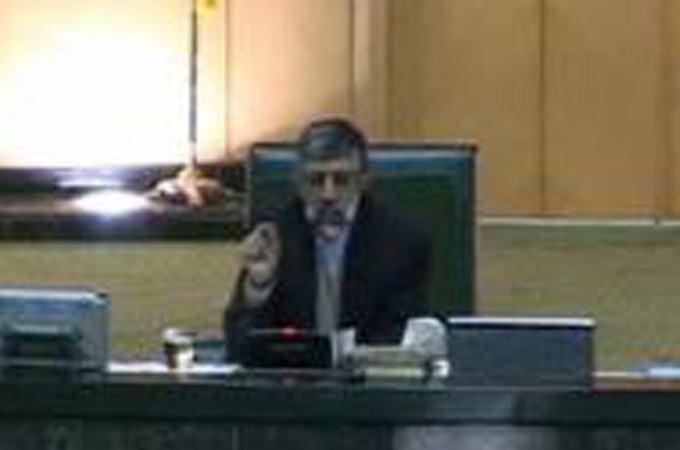 |
| Haddad Adel holds a PhD in philosophy and a master’s in physics [Reuters] |
Gholam-Ali Haddad Adel, 68, is a top advisor to Iran’s Supreme Leader, Ali Khamenei, as a member of the Expediency Council, which is directly appointed by the Supreme Leader.
He is a current member of Iran’s ninth parliament and the head of the parliament’s conservative “principlist” faction.
Haddad Adel is a former speaker of parliament from 2005 to 2008 but he failed to secure the position again in 2012, with Ali Larijani obtaining the most votes.
He was also the first non-cleric speaker to be elected to parliament, and has served four consecutive terms as a Tehran MP, topping the polls in March 2010.
He has held numerous positions in government, in Culture and Islamic Guidance, Education, Philosophy, and the Academy of Persian Language and Literature.
Born in 1945 in Tehran, he holds a PhD in philosophy and a master’s degree in physics.
Haddad Adel was among 44 members on Iran’s Freedom Movement who were jailed in 1971 by the Shah regime for 66 days, in which they published the People’s Mujahedin Movement of Iran.
He has family ties with the Supreme Leader, whose son is married to Haddad Adel’s daughter. Haddad Adel, who led the Islamic Iran Developers Coalition (Abadgaran-e Iran-e Eslami) party in 2004, is thought to be among those in the Supreme Leader’s inner circle.
He supported Mahmoud Ahmadinejad in the last presidential election in 2009 as part of the principalist faction in parliament.
In what could be interpreted as his importance to Khamenei, he was a member of a special delegation selected by the Supreme Leader to investigate protester complaints about the previous presidential election.
He has formed a coalition of principalists with Ali Akbar Velayati and Mohammad Bagher Qalibaf, a move criticised by others within the faction.
According to the Iran Daily Brief, Haddad Adel has said the economy tops the country’s priorities.
Haddad Adel dropped out of the race on June 10.
| Hassan Rouhani |
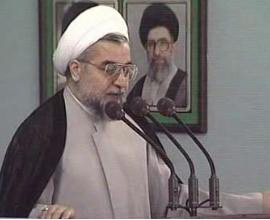 |
| Rouhani is seen as a moderate conservative [Reuters] |
Hassan Rouhani, born in 1948 into a family that opposed the former Shah of Iran, has held various roles in government since the Islamic Revolution. He is currently a member of the Supreme National Security Council, a position he has held since 1989.
Rouhani was born in Sorkheh in northern Iran and began studying religion at an early age. In the 1960s he went to religious seminaries and began attending classes taught by prominent Shia scholars. In 1969, he attended the University of Tehran and received his bachelor’s degree in judicial law three years later.
In addition to religious studies, he was interested in learning modern sciences, going on to receive a master’s degree in public law along with a doctorate at Glasgow Caledonian University in Scotland.
He began his political career in the 1960s by following the exiled leader of the Islamic movement, Ayatollah Khomeini. Rouhani continued to be outspoken against the Shah up until 1977, when he was forced to flee Iran after publically declaring Khomeini an “imam”.
After the overthrow of the Shah in 1979, Rouhani returned to Iran to help stabilise the fledgling Islamic Republic.
Since the government takeover of the Islamic Revolution, Rouhani has held multiple positions, including Secretary and Representative of the Supreme National Security Council, member of the Assembly of Experts, member of the Expediency Discernment Council, President of the Center for Strategic Research, and multiple roles in Parliament.
After the election of Mahmoud Ahmadinejad in August 2005, Rouhani, an outspoken critic of the president, resigned his post as Secretary of the Supreme National Security Council after having held the job for 16 years. Rouhani also served as Iran’s top nuclear negotiator from October 2003 up until his resignation from the SNSC.
Rouhani earned the nickname “the diplomat sheikh” because of his clerical background and leading role in nuclear negotiations. With his centrist views and close ties to the ruling clerical elite, he is considered a top contender in the 2013 elections.
| Mohammad-Reza Aref |
Mohammad-Reza Aref served as Iran’s first vice-president from 2001 to 2005 under former President Mohammad Khatami, which may garner votes from moderates in the country.
A liberal-leaning reformist candidate who made the Guardian Council’s cut for the upcoming election, Aref was previously the minister of Communications and Information Technology and later the first president of the Management and Planning Organisation of Iran.
He is a member of the Supreme Council of Cultural Revolution, which seeks to avoid foreign cultural influences and ideologies; and also the Expedience Discernment Council, an advisory body to Ayatollah Khamenei. Members of both bodies are handpicked by the Supreme Leader.
A trained engineer hailing from the central Iranian city of Yazd, Aref teaches at Tehran’s Sharif University of Technology and previously taught at Isfahan University of Technology. He was the president of Tehran University, his alma mater, from 1997 to 2000. He holds a master’s degree and a PhD in electrical engineering and statistics from Stanford University in the US.
Currently, the 62-year-old is also the chief executive of Baran Foundation, a non-governmental group founded by Khatami that stands for the “freedom growth and prosperity of Iran”. It was outlawed by the Iranian interior ministry in January 2011 for allegedly not following proper licensing procedures.
He blames a lack of consensus among reformists for the outcome of the 2005 and 2009 elections, and vowed to withdraw his candidacy from this election only if a candidate he considers competent joins the race. He opted out of both previous elections in favour of former president Hashemi Rafsanjani and Khatami.
After signing up for the presidential race earlier this month, Aref said he will remain “committed to the law” throughout the election process, promising to implement an economic plan to propel the country out of inflation and to achieve development and progress.
He also added that if elected, his administration would bolster Iran’s international relations and will find a “political solution” to closing the “[nuclear] dossier once and for all”.
He said he sees no reason to be disqualified from the elections, citing his professional and political experience: “I have served over the past three decades and worked in line with the values [of the Islamic Revolution] and at the same time I am a law-abiding individual.”
Aref dropped out of the race on June 11 at the behest of Khatami.
| Mohammad Gharazi |
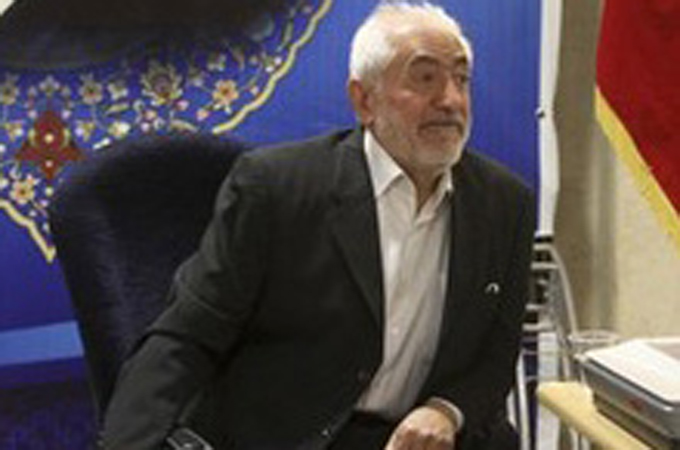 |
| Mohammad Gharazi aims to limit inflation if elected president [AP] |
Mohammad Gharazi is one of the dark horses in the Iranian presidential elections. This is his first presidential run, and little is known about him.
Before the 1979 revolution, he was a member of Mojahedin-e Khalq (MEK), an organisation that at first supported Ayatollah Ruhollah Khomeini, but which later supported Iraq in its war against Iran. He served as the Minister of Petroleum from 1981-85 and was the minister of the Post, Telegraph, and Telephone from 1985-97. After his stints as a senior government official, he left the political arena.
His campaign focuses on economic issues, and has promised to run an “anti-inflation” administration. He is the only independent candidate approved to run in the presidential election this year.
| Mohsen Rezaei |
Mohsen Rezaei, a conservative candidate, is the Secretary of the Expediency Discernment Council, a 13-member council that aims to bridge the differences of the Islamic Assembly and Council of Guardians.
In 1981, at the age of 27, Rezaei became the commander of the Iran Revolutionary Guard Corps. During his time as commander, he was embroiled in controversy in 1994, where he allegedly planned a suicide bombing at a Jewish cultural centre in Argentina. Twenty-two years later, an Argentine court issued an arrest warrant for his alleged involvement.
After his tenure at the Revolutionary Guard, Rezaei assumed the role of Secretary and Chair of the Commission for Macroeconomics and Commerce in 1998. He is seen a personal friend of Supreme Leader Ali Khamenei.
At the beginning of the 2009 elections, Rezaei strongly objected to Mahmoud Ahmadinejad’s Holocaust comments, calling them “not useful”.
Rezaei announced his run for presidency in October 2012. His platform focuses on economic issues, and he has publicly criticised Ahmadinejad’s handling of Iran’s oil revenues.
